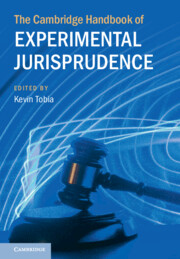Book contents
- The Cambridge Handbook of Experimental Jurisprudence
- The Cambridge Handbook of Experimental Jurisprudence
- Copyright page
- Contents
- Contributors
- Acknowledgments
- Dedication
- Part I Foundations and Theory
- 1 Introduction
- 2 Psychology and Jurisprudence across the Curriculum
- 3 Holmes, Legal Realism, and Experimental Jurisprudence
- 4 The Empirical Component of Analytic Jurisprudence
- 5 The Limits of Experimental Jurisprudence
- 6 Competing Conceptual Inferences and the Limits of Experimental Jurisprudence
- 7 The Contours of Bias in Experimental Jurisprudence
- 8 Experimental Jurisprudence and Doctrinal Reasoning
- 9 Law and Morality
- 10 Legal Constraint
- Part II Introductions
- Part III Applications
- Index
6 - Competing Conceptual Inferences and the Limits of Experimental Jurisprudence
from Part I - Foundations and Theory
Published online by Cambridge University Press: 17 May 2025
- The Cambridge Handbook of Experimental Jurisprudence
- The Cambridge Handbook of Experimental Jurisprudence
- Copyright page
- Contents
- Contributors
- Acknowledgments
- Dedication
- Part I Foundations and Theory
- 1 Introduction
- 2 Psychology and Jurisprudence across the Curriculum
- 3 Holmes, Legal Realism, and Experimental Jurisprudence
- 4 The Empirical Component of Analytic Jurisprudence
- 5 The Limits of Experimental Jurisprudence
- 6 Competing Conceptual Inferences and the Limits of Experimental Jurisprudence
- 7 The Contours of Bias in Experimental Jurisprudence
- 8 Experimental Jurisprudence and Doctrinal Reasoning
- 9 Law and Morality
- 10 Legal Constraint
- Part II Introductions
- Part III Applications
- Index
Summary
Legal concepts can sometimes be unclear, leading to disagreements concerning their contents and inconsistencies in their application. At other times, the legal application of a concept can be entirely clear, sharp, and free of confusions, yet conflict with the ways in which ordinary people or other relevant stakeholders think about the concept. The aim of this chapter is to investigate the role of experimental jurisprudence in articulating and, ultimately, dealing with competing conceptual inferences either within a specific domain (e.g., legal practice) or between, for example, ordinary people and legal practitioners. Although this chapter affirms the widespread assumption that experimental jurisprudence cannot, in and of itself, tell us which concepts should be applied at law, it highlights some of the contributions that experimental jurisprudence can, in principle, make to normative projects that seek to prescribe, reform, or otherwise engineer legal concepts. Thus, there is more that experimental jurisprudence can normatively offer than has usually been claimed.
Keywords
Information
- Type
- Chapter
- Information
- The Cambridge Handbook of Experimental Jurisprudence , pp. 92 - 109Publisher: Cambridge University PressPrint publication year: 2025
